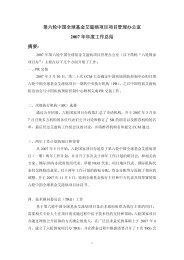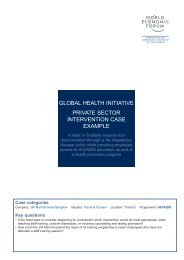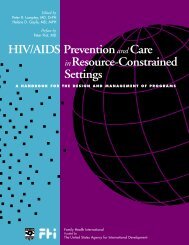The Training of Trainers Manual - UNFPA
The Training of Trainers Manual - UNFPA
The Training of Trainers Manual - UNFPA
You also want an ePaper? Increase the reach of your titles
YUMPU automatically turns print PDFs into web optimized ePapers that Google loves.
Handout 14 • Monitoring and Evaluation <strong>of</strong> Peer Education Programmes 14<br />
What are monitoring and evaluation<br />
Monitoring is the routine and systematic process <strong>of</strong> collecting data and measuring progress towards<br />
programme objectives. Questions that monitoring activities seek to answer include: Are activities<br />
occurring as planned Are services being provided as planned Are the objectives being met<br />
Monitoring supports evaluation, as the two are closely related.<br />
Evaluation is the process <strong>of</strong> systematically assessing a project’s merit, worth, or effectiveness. In this<br />
process, the relevance, performance, and achievements <strong>of</strong> a programme are assessed. <strong>The</strong> evaluation<br />
process addresses the question: Does the programme make a difference <strong>The</strong> common types <strong>of</strong><br />
evaluation include process evaluation, outcome evaluation, and impact evaluation.<br />
Process evaluation consists <strong>of</strong> quantitative and qualitative assessment to provide data on the strengths<br />
and weaknesses <strong>of</strong> components <strong>of</strong> a programme. It answers questions such as: Are we implementing<br />
the programme as planned What aspects <strong>of</strong> the programme are strong Which ones are weak Does<br />
the programme reach the intended target group What can we do to strengthen the programme<br />
Are we running into unanticipated problems Were remedial actions developed Were these actions<br />
implemented<br />
Outcome evaluation consists <strong>of</strong> quantitative and qualitative assessment <strong>of</strong> the results <strong>of</strong> the programme.<br />
Outcome evaluation addresses questions such as: Were outcomes achieved How well were they<br />
achieved If any outcomes were not achieved, why were they not What factors contributed to the<br />
outcomes How are the target groups and their community impacted by the programme Are there any<br />
unintended consequences What recommendations are <strong>of</strong>fered for improving future implementation<br />
What are the lessons learned<br />
Impact evaluation is the systematic identification <strong>of</strong> a programme’s effects – positive or negative,<br />
intended or unintended – on individuals, households, institutions, and the environment. Unlike an<br />
outcome evaluation, which is focused at the programme level, impact evaluation is typically carried out<br />
at the population level and refers to longer-term effects.<br />
Section 4. Participant Handouts<br />
159

















